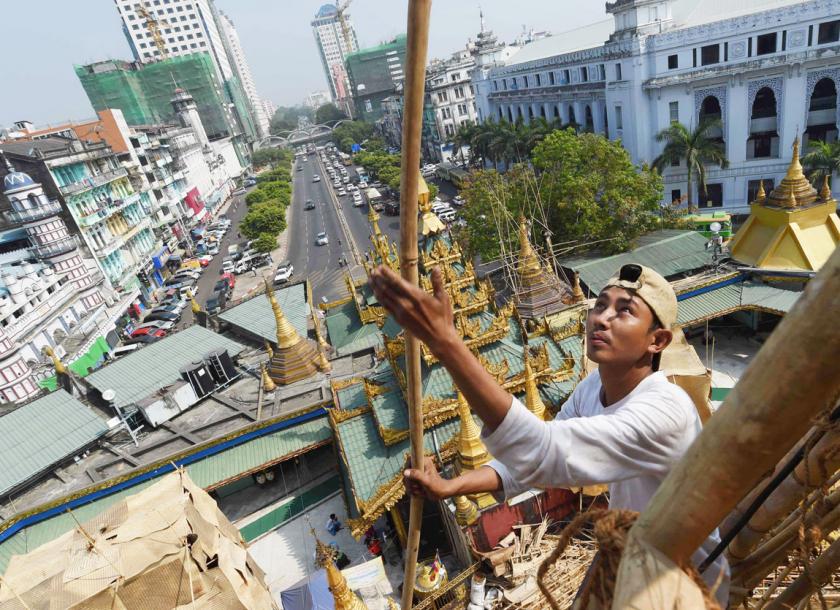More investments are needed to develop Yangon into a regional economic and trading hub (U Phyo Min Thein, Yangon Region Chief Minister)
17 ตุลาคม 2560
Plans are underway for Yangon, Myanmar’s largest city, to be developed into a regional economic and trading hub, Yangon Region Chief Minister U Phyo Min Thein told representatives from the Oxford Business Group (OBG) on October 9.
There are opportunities for Yangon to become a gateway hub for its landlocked neighbours by enabling them to gain access to international markets through the Port of Yangon, for example. The city can also leverage on its status as the country’s commercial and trading hub to draw business activity and growth.
To achieve this, the city will need to invest in improving its current transportation infrastructure, U Phyo Min Thein told OBG. The research firm met with the chief minister as part of its work on a fifth in-depth report on the Myanmar economy.
Yangon’s infrastructure has not kept up with its growing population, and this is now putting pressure on the city’s management and public service providers, said U Phyo Min Thein. Traffic congestion is a major problem as a result of poor road connectivity and conditions, for example.
So far, the Yangon government has already launched a centralised city bus and water taxi network to provide commuters with an affordable means of transport, while work on upgrading its Circular Train System is expected to start soon.
Industrial opportunity
Yangon can also raise its attractiveness as an industrial and manufacturing hub by expanding existing production and storage capacities, U Phyo Min Thein said.
In fact, the Yangon government is planning to create twelve new industrial zones in the region to boost manufacturing and attract investments, he said at the Union of Myanmar Federation and Chamber of Commerce and Industry meeting last week.
There are currently already 29 industrial zones in the Yangon. However, they are located within the municipal region. As such, the new zones will be developed in the outskirts of Yangon to create more job opportunities in those areas.
To facilitate the anticipated challenges in developing the zones, private businesses were advised to work close with the Yangon City Development Committee as well as the Ministry of Industry and the Ministry of Construction to overcome issues like squatter resettlements, sewer systems and road connectivity.
Meanwhile, Yangon businesses also pressed the government to prioritise local manufacturers and service providers over foreign businesses during its tender process.
Rising investments
The government’s focus on promoting Yangon as a regional trading hub comes amid an uptick in foreign direct investments (FDI) and interest so far this year. In the first half of the 2017-18 Fiscal Year, which is between April and September, approved FDI in Myanmar hit $4.3 billion, which is up three times from the same period the year before, when FDI totaled just $1.3 billion, according to U San Myint, deputy director general at the Directorate of Investment and Company Administration.
On September 25, the Myanmar Investment Commission approved initial capital inflows of $403.4 million from nine foreign companies, seven of which would operate in the industrial sector. The remaining two are companies in the real estate development sector. The investments came from China, Singapore, Japan, the US and UK.
The MIC also approved eight citizen investments in industry, agriculture, livestock and fisheries, worth K12.3 billion.
Notably, U San Myint said recent investment trends are changing in favour of manufacturing, with more than a third of the year’s FDI channeled into sector compared to before.
In FY 2016-2017, Myanmar attracted over $6.8 billion in FDI, half of which was ploughed into the transport and communication sectors.
Interest in Myanmar is also rising among a wider range of investors, with countries like Russia, which is looking to set up a trade office in Yangon early next year, and Israel, which recently signed an agreement with Myanmar to protect its investments in the country.
Last month, India also launched its Indo-Myanmar Chamber of Commerce in the city, with an aim to double its trade with the country to $4 billion over the next few years.
(The Myanmar Times: https://www.mmtimes.com/news/investments-needed-develop-yangons-status-regional-trade-hub.html )











